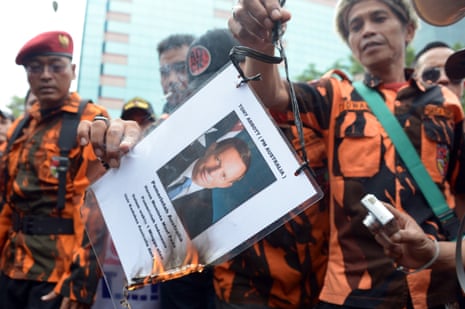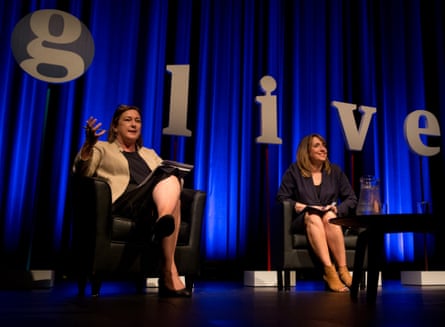Lenore Taylor remembers the pressure she felt carrying a USB stick from Sydney to Canberra with the contents of a top-secret leak implicating the Australian government in a spying scandal that reached the then president of Indonesia’s personal mobile phone.
It was 2013 – the same year that David Miranda, the late partner of former Guardian journalist Glenn Greenwald, was detained in Heathrow airport for nine hours after a series of stories revealed mass surveillance programs by the US National Security Agency.
Guardian Australia’s now editor was “relieved” when she reached the capital safely.
“When I was first handed the documents we had to make sure we didn’t have phones with us,” she says.
“We were very, very cautious. I was somewhat astonished when it became apparent to me that the security agencies were aware that we were going to publish a story before I’d ever contacted them or talked to them about it.”
The leaked slide presentation obtained from the US whistleblower Edward Snowden revealed that Australian spy agencies had tried to listen in on the personal phone calls of the then Indonesian president, Susilo Bambang Yudhoyono, and his associates.
Dated November 2009, it named his wife, Kristiani Herawati – better known as Ani Yudhoyono – as being among nine of his inner circle targeted by surveillance.
“I was alarmed,” Taylor says. “The idea that you do a ‘how to tap an ally’s phone’ presentation was quite shocking to me.
“I felt that Australians would certainly think that it was in the public interest to know if Indonesians were tapping the phone of Margie Abbott. So the reverse was also true.”
The bilateral relationship was already under pressure over the newly elected Abbott government’s policy to “turn back” boats of asylum seekers heading for Australia.
It also followed the leak of a separate document from Snowden, which showed Australia had spied on Indonesia and other countries from its embassies.
The new leak, published jointly by Guardian Australia and the ABC, seriously escalated tensions.
“It was so sensitive for the government because it was right when they needed Indonesian cooperation in terms of terrorism, counter-terrorism intelligence … to make their asylum policy work,” Taylor says.
“That was one of the main things they’d been elected on. It had huge fallout in Australian politics. It took a good year for it to blow over.”
The documents were complicated, in large part because the leaked material was a slide presentation, marked top secret, from the Defence Signals Directorate – now the Australian Signals Directorate – and the Department of Defence.
It was clearly highly sensitive but also hard to understand.
“We did actually go to the security agencies ahead of publication to make sure that we weren’t inadvertently revealing something that would put someone in danger,” Taylor says.
“We needed to be clear about what we were doing. Without going into private conversations, it’s fair to say they would have preferred we didn’t publish it at all … but that wasn’t the question we were asking.
“We were asking whether there were any unforeseen consequences to publication that we might not be aware of and, when we had those conversations and agreed the terms of collaboration with the ABC, we went ahead and published.”

The collaboration with the ABC was suggested by the then editor of Guardian Australia, Katharine Viner, and the Guardian’s then global editor-in-chief, Alan Rusbridger.
“My initial inclination was, ‘Why on earth would we do that? It’s our story,’” Taylor says. “But the more I thought about it, the more it did make sense.”
The Guardian had only launched in Australia five months before the leak. It was operating as a tiny team.
“Obviously the story was going to have massive ramifications in Indonesia,” Taylor says. “We needed to be able to follow it there. And we didn’t have the capacity to do that.”
The ABC immediately agreed, and Viner joined Taylor in Canberra with Jo Puccini and Michael Brissenden of the ABC.
“We all met on my veranda – without phones,” Taylor says.
Collaborating with the ABC ultimately came at a cost to the national broadcaster.
“The then Abbott government really attacked the ABC for collaborating with us,” Taylor says. “So did Malcolm Turnbull, who was communications minister at the time.
“Abbott said that the ABC was acting as an ‘advertising amplifier’ for the Guardian. I remember [then managing director] Mark Scott having to defend at Senate estimates the decision to collaborate with us much more than the actual story itself.”
Guardian Australia was caught up in its own controversy, too, as the Coalition questioned why the revelations hadn’t been released while the former Labor government was still in office.
“There was this enormous cache of documents, which our colleagues internationally were sifting through, and then eventually, they came across this one,” Taylor says.
“Within a week of looking at it, we had published it, so that wasn’t true, but there were all sorts of conspiracies going around.”

At the same time, the Australian newspaper staked out Guardian Australia’s office, placing a photographer in the corridor of the Canberra press gallery in the hope of papping Viner as she emerged.
“Kath stayed there till seven at night until after edition time to deny them the privilege,” Taylor says.
By then, the story had taken on a life of its own. “It had immediate and enormous reactions in Canberra,” Taylor says.
“It was the main focus of political debate of question time. It caused immediate ructions in Indonesia, there were demonstrations outside the Australian embassy. Australian flags were burnt … there was a very angry response.”
Eventually, Indonesia recalled its ambassador in Australia and suspended military and intelligence cooperation.
“The ferocity of the Indonesian reaction was a bit surprising to me,” Taylor says.
“There’d already been from the Snowden documents revelations of the US spying on allies, including Germany and Brazil … there was a lot of discussion about how prevalent spying was.”
Later Yudhoyono wrote a book detailing his outrage at the intimacy of his wife’s personal phones being targeted.
“But I think what really escalated it was Tony Abbott’s reaction, he just refused to apologise or look contrite at all,” Taylor says. “That magnified that anger in Jakarta.”
Instead, Abbott dug his heels in, telling parliament: “I don’t believe Australia should be expected to apologise for reasonable intelligence-gathering activities.”
Taylor says Abbott could have calmed the situation more quickly had he been “a little tiny bit conciliatory”.
“But I guess that wasn’t really in his nature. Tony Abbott’s approach was to try to crash through.”
It took almost a year for the then immigration minister, Julie Bishop, and Yudhoyono to sign a code of conduct for spying, a kind of “how-to guide” within the bounds of the relationship.
“They said we might spy on each other in ways that wouldn’t hurt each other,” Taylor says. “I don’t know whether it was meaningful but it was a way of drawing a line under the whole argument.”
